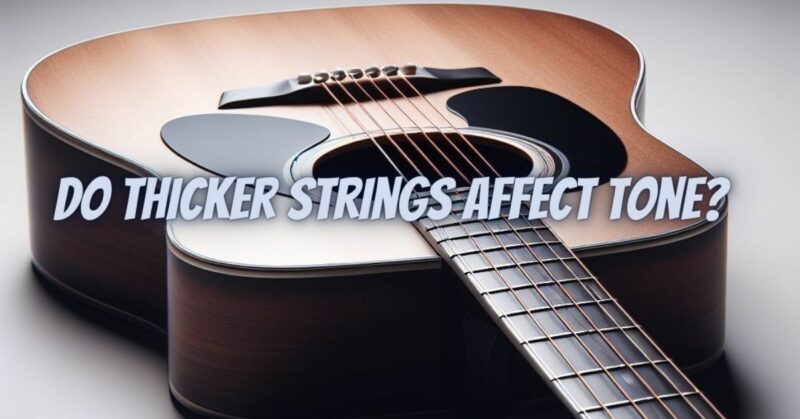Guitarists are a passionate bunch, constantly seeking ways to shape and refine their unique sound. One often-debated aspect of guitar playing is the choice of string gauge. Musicians frequently ponder whether thicker strings affect tone and, if so, how they can harness this influence to create their desired sonic palette. In this article, we delve into the complex relationship between string gauge and tone to provide a comprehensive understanding of the subject.
String Gauge Basics
Before we dive into the impact of string gauge on tone, let’s establish a basic understanding of what string gauge is. String gauge refers to the thickness or diameter of a guitar string, typically measured in thousandths of an inch (e.g., 0.010 inches). Common gauges include extra-light (0.009-0.042), light (0.010-0.046), medium (0.011-0.049), and heavy (0.012-0.052). Thicker strings have larger diameters, which can affect various aspects of your playing experience, including tone.
Tone and String Gauge
- Sustain and Resonance: One of the most significant ways string gauge influences tone is through sustain and resonance. Thicker strings tend to produce longer sustain and enhanced resonance. This is because thicker strings have more mass, which allows them to vibrate for a more extended period and transfer more energy to the guitar’s body. This results in a fuller, richer sound with pronounced sustain.
- Brightness vs. Warmth: The choice of string gauge also impacts the tonal balance of your guitar. Thicker strings tend to produce a warmer, more rounded tone with emphasis on the lower frequencies. Conversely, thinner strings tend to be brighter and more treble-focused. Therefore, if you prefer a bright, cutting sound, you may opt for lighter gauges, while thicker strings will deliver a warmer, more mellow tone.
- Playability and Technique: While tone is a crucial consideration, it’s essential to balance it with playability and technique. Thicker strings generally require more finger strength to press down on the frets, which can be challenging for beginners or players with smaller hands. On the other hand, lighter gauge strings are more forgiving in this regard. Your choice should align with your playing style and comfort.
- Tension and Bending: String gauge significantly affects string tension. Thicker strings have higher tension, which can make bending notes more challenging, particularly for techniques like blues bends. Lighter gauge strings are easier to bend, providing a more expressive and dynamic playing experience.
- Tuning Stability: Thicker strings tend to hold their tuning better, especially when using alternate tunings or employing techniques like aggressive bending. This can be a critical factor for live performances or recording sessions where precise tuning is essential.
- Genre and Playing Style: Your preferred musical genre and playing style also play a crucial role in selecting the right string gauge. For example, many jazz guitarists prefer heavier gauge strings for their warm, articulate tone, while blues and rock players often opt for lighter gauges for increased bending and expression.
Experimentation and Personal Preference
Ultimately, the impact of string gauge on tone is subjective and depends on your personal preferences and playing style. It’s essential to experiment with different gauges to find the sound that best suits your musical aspirations. Many accomplished guitarists have developed their unique tones by carefully selecting string gauges that complement their playing style and musical genre.
In the world of guitar playing, the choice of string gauge is a significant factor that can influence tone, playability, and overall musical expression. Thicker strings tend to provide enhanced sustain, warmth, and resonance, while thinner strings offer brighter tones and easier playability. When selecting string gauges, it’s crucial to strike a balance between your desired tone and your playing style, finger strength, and technique. Remember that there is no one-size-fits-all answer, and the best string gauge for you is the one that helps you create the music you love. So, don’t be afraid to explore different gauges and let your ears be your guide in shaping your unique guitar sound.


